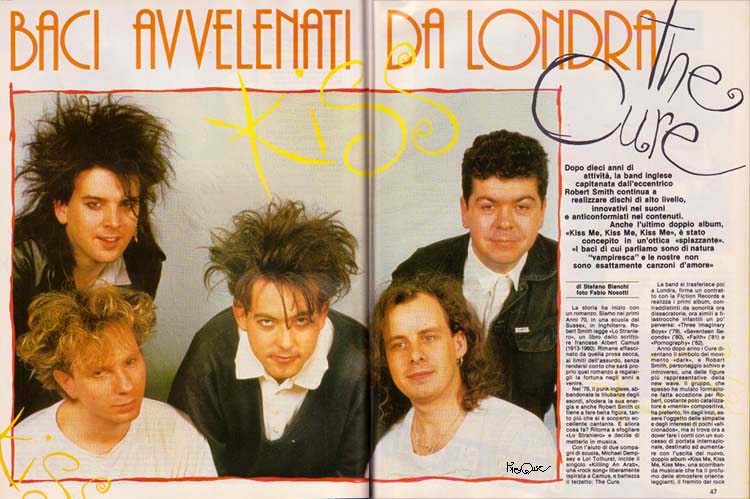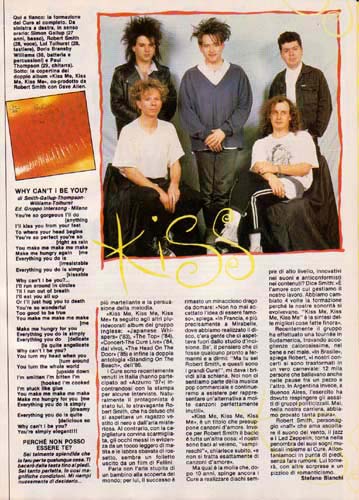ARTICLE - Poisoned Kisses From London (3 pages)


June 1987 - Tutto (Italy)*
(Translation below)
ARTICLE -
Poisoned Kisses From London
(3 pages)


POISONED KISSES FROM LONDON
AFTER 10 YEARS OF ACTIVITY, THE ENGLISH GROUP LED BY THE ECCENTRIC ROBERT SMITH KEEPS ON REALIZING HIGH-LEVEL RECORDS, WITH INNOVATORY SOUNDS AND NON-CONFORMIST CONTENTS.
THE LAST DOUBLE ALBUM, “KISS ME KISS ME KISS ME” HAS BEEN REALIZED WITH A “STRIKING” POINT OF VIEW TOO.
“THE KISSES WE ARE TALKING ABOUT ARE “VAMPIRE KISSES”, AND OUR SONGS AREN’T EXACTLY LOVE SONGS….”
The story begins with a book. We are in the first part of the 70’s, in a school in Sussex, England. Robert Smith reads “The Stranger”, a book by Albert Camus (1913-1960). He was fascinated by that dry prose, almost absurd, without realizing that this book will make his fortune in the next years.
In ’78 English punk movement, after the initial hesitations, shows its energy and also Robert Smith looks smart since he discovered himself as an excellent singer. So, what did he do? He turned back on “The Stranger” and decided to put it on music. With the help of 2 schoolmates, Michael Dempsey and Lol Tolhurst, he records the single “Killing an Arab”, a “rock song” inspired by Camus, and calls the trio: The Cure.
The band later moves to London, gets a contract with Fiction Records and realizes its first albums, characterized by a sound sometimes provocative, sometimes similar to perverse/childish lullabies: “Three Imaginary Boys” (’79), “Seventeen Seconds” (80), “Faith” (81) and “ Pornography” (82).
Year after year the Cure became a symbol for the “dark” movement, and Robert Smith, a shy and introverse character, became one of the most representative figures of the new wave.
The band, which often has changed its members, except Robert Smith, the constant pole and creative mind, has always preferred to be the object for few “aficionados”, but now is facing a big international success which will grow with the new album, “Kiss me kiss me kiss me”, a musical trip into oriental atmospheres, rock thrills and charming melodies.
“Kiss Me Kiss Me Kiss Me” follows many other rewarded albums: “Japanese Whispers” (83), “The Top” (84), “Concert-The Cure Live” (84), “The Head on the Door” (85) and at the end the double anthology “Standing on the Beach” (86).
The Cure has recently come to Italy (they took part at “Azzurro” ’87, an Italian music-show) where they met the press for some interviews.
Naturally the protagonist was him, the extravagant Robert Smith, who disappointed who was looking for a black-dressed boy with mysterious look. On the contrary, with his dark-dishevelled hair, his marked-up eyes and the lips with red smudged lipstick, he really looks like an elf from a Fellini’s movie.
He talks with a stunned mood, like a child discovering the world; success still remains for him a dangerous dragon to be tamed: “I have never accepted the idea of being famous” he explains.
“In France, exactly in Mirabelle, where we made the album, there were people waiting for us outside the recording studio. Well, thinking about someone ready to stop me and say: “Hey, you’re Robert Smith and these are the great Cure!” really gave me the shiver. We don’t consider us a part of the commercial pop music, and we’ll keep on existing as an alternative band to a lot of useless songs”.
“Kiss Me Kiss Me Kiss Me” is a title which suggest love songs. On the contrary for Robert Smith the kiss is another thing “Our ones are poisoned kisses, “vampire kisses”, he says, “and they’re not exactly love songs”.
But what is the secret that, after 10 years, pushes The Cure to realize high-level records, with innovatory sounds and non-conformist contents? Smith says “That’s the love we have for our work. We changed the formation 4 times because our sound was evolving. “Kiss me kiss me kiss me” is the synthesis of the best things done.”
Recently the band had a tourney in South America, with a good welcome, in good and bad times. “In Brazil”, Robert explains, “ our show became a real carnival: 12.000 people dancing, also during the stops between the songs”.
“In Argentina, on the contrary, in Buenos Aires, the army had to drive back some politicized groups. We have never been feared like that!”.
Robert Smith, a “naïf” character, who loves listening to the wind, to jazz and Led Zeppelin, turns back in the darkness with his music-dreams with the Cure.
Let’s go away on tip-toe, without noises.
He will return, with some other surprises and a little bit of romanticism.
(written by Stefano Bianchi)
Thanks so much -
Claudia Darpi for TRANSLATING.